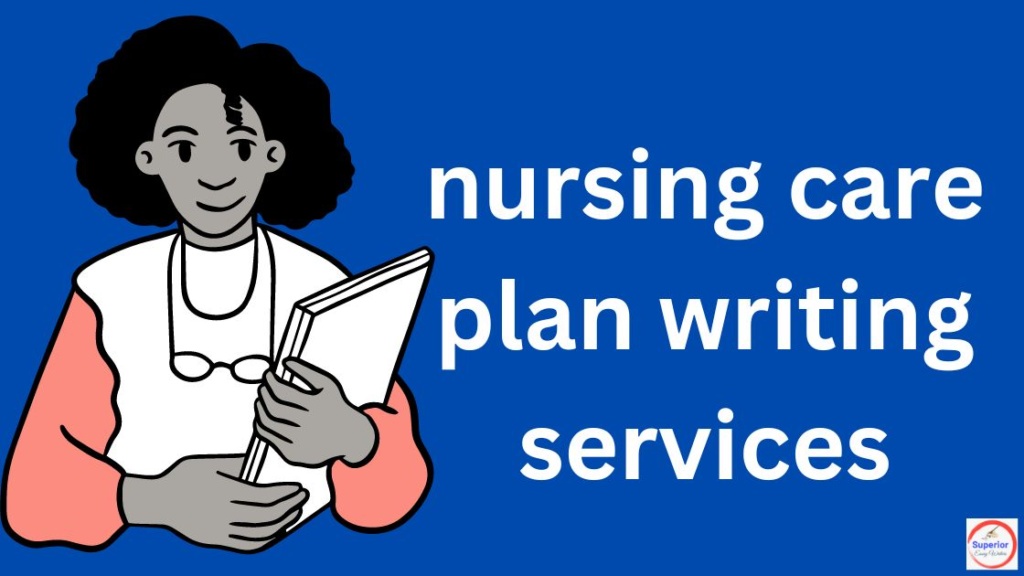
nursing care plan writing services
Looking for a Nursing care plan writing services? There is no need for you to look any further. To ensure that you achieve your deadline and produce high-quality work, our team of specialists is here to assist you. No more worries about missing deadlines or plagiarizing your work. Place an Order
You don’t have to worry about overspending because we guarantee our services at a reasonable price! Use the Live Chat to get in touch with us.
Quality Nursing Care Plans: How To Write Them
Writing a quality nursing care plan efficiently is very beneficial to you as a nurse, despite what most people believe. A hospital’s care plan is a vital communication tool. With the help of patient care plans, hospitals are able to provide high-quality treatment in a professional manner.
Important of a Care Plan for the Elderly
In order for a nurse to effectively communicate with patients and their families, a care plan is essential. As a result of the patient’s care plan, every aspect of their care is planned out and carried out in a logical manner. Regardless of the number of shifts, the quality of care is the same.
For the same reason, hospitals require comprehensive medical records when delegating responsibilities to employees. When patients are assigned to different staff members, care plans are essential to ensure that everyone receives the appropriate treatment.
Medicaid, Medicare, and other insurance companies require a patient’s medical records to process claims and reimburse them.
A care plan helps caregivers think ahead and plan, which is the most important benefit. A care plan is a document that specifies how you will be taken care of.
Get nursing care plan writing services Writing Help From Professional Nurse Writers assistance with writing a nursing care plan While a nursing care plan writing service is not for everyone, it does offer numerous significant benefits. However, why is it critical to create care plans? Why are care plans required in practically every other class? Certain individuals in the healthcare industry believe that nursing care plans are a waste of time. Nursing care plans, on the other hand, are a global reality. They are unavoidable. The ideal nursing care plan writing service enables you to consistently generate care plans quickly and accurately.
Numerous nursing students and nurses despise the process of creating nursing care plans.
Why should you choose superioressaywriters.org to assist you with nursing care plan writing? Numerous nursing students and nurses take pleasure in reintroducing their patients to a state of robust health and enjoyment. However, not everyone appreciates the process of creating care plans. Writing nursing care plans can be a time-consuming process. Additionally, it is time demanding. However, the situation deteriorates. Care plans can greatly increase the effort that a nurse or student must manage on a daily basis. Having said that, these documents are a part of everyday life in the nursing profession. Accept that you will always write them. Therefore, look for ways to make the experience more bearable. The correct nursing care plan writing service can even contribute to the enjoyment of the experience! Finally, you’ll increase your writing abilities and boost your competency. At Expert Drafting Help, we have a team of nurses who can aid you with writing nursing care plans for a variety of illnesses.
Justifications for Mastering the Art of Writing High-Quality Nursing Care Plans Regardless of what anyone else believes, care plans are not a waste of time. They are critical. Without these records, hospitals would struggle to maintain a high standard of patient care. Care plans are an essential tool for communicating between nurses, patients, families, and other healthcare professionals involved in the nursing process.
Do my nursing care plan
Nursing care plans enable nurses to give clients and their families appropriate advice and instructions. Apart from that, these records serve as a guide for all individuals involved in patient care. Care plans ensure that all aspects of patient care are coordinated and consistent. Patients receive the exact care they are expected to receive regardless of who is working what shift.
Additionally, care plans serve as a record of the care that patients get. Medicaid, Medicare, and other insurance companies require precise medical records in order to receive reimbursement. Additionally, when assigning workers to patients, care plans are crucial. Correctly prepared records ensure that patients are receiving care from the appropriate person at any given time. Most importantly, care plans teach you to think like a professional nurse by teaching you to think, problem-solve, and analyze patient data. Are you having difficulty preparing nurse care plans for clinical? It is past time for you to call the most qualified nursing care plan writing service.
How Should a Nursing Care Plan Be Written?
Nursing students are frequently obliged to write a nursing care plan, which may be longer than the actual care plan due to the fact that it is solely for educational purposes. If you are prepared to take on the task of developing your nursing care plan without the assistance of a nursing care plan writing service, ensure that you follow the steps below. Let us begin!
Step 1: Collecting and analyzing data is the first step.
To begin, ensure that you create a database for your client/patient using assessment and data collection methods such as physical examination, health history, interview, review of medical records, and diagnostic studies. The database should contain all of the patient’s health information that you have acquired.
As a nurse, you can use this section to identify risk factors and obvious characteristics that can be used to develop a nursing diagnosis. Inquire with your tutor about the appropriate format.
Step 2: Analyze and Organize the Data
Analyze, arrange, and organize the data collected regarding your patient’s health in order to explain your nursing diagnosis, immediate priority, and intended outcome.
Step 3: Developing Nursing Diagnoses
Nursing diagnoses enable you to pinpoint, prioritize, and address specific patient requirements and responses to acute, actual high-risk situations. As a result, these actual or future health problems that you may avoid or address on your own through nursing involvement are referred to as nursing diagnoses.
Step 4: Prioritize
Here, you will establish the order in which you would like to address nursing diagnoses and interventions. The nurse and patient immediately begin discussing and planning which diagnoses need additional care. Such diagnoses can be prioritized as high, medium, or low. As a result, life-threatening situations must be given first priority.
Step 5: Establish the Client’s Objectives and Desired Outcomes
After prioritizing your nursing diagnosis, the nurse and client establish objectives for each priority. The desired outcomes or goals outline what the nurse hopes to accomplish through the nursing interventions and are derived from the nursing diagnoses of the client.
These objectives chart a course for intervention scheduling and serve as yardsticks for assessing the client’s development. This enables the patient and nurse to conclude difficulties that have been resolved, motivating both parties through a sense of accomplishment.
Step 6: Nursing Interventions Selection
These are the actions that a nurse must take in order to help the client reach their goals. The interventions adopted are aimed at mitigating or eliminating the nursing diagnosis’s implications. In light of the nursing diagnosis risk, interventions should be directed exclusively toward reducing the patient’s risk factors.
This section is where you will identify and document your nursing interventions during the planning stage of the nursing process. These interventions are carried out during the implementation phase for practicing nurses, as they will apply to nurse students.
Step 7: Providing an Explanation Scientific
Scientific explanations, alternatively referred to as rationales, are the primary reasons for selecting the nursing intervention for the nursing care plan.
They are not included in routine care plans because they aid nursing students in linking pathophysiological and psychological principles with the chosen nursing intervention.
Step 8: Assessment
This is the planned, decisive action in which the progress of your patient/client toward achieving the set objectives and desired outcome, as well as the effectiveness of the nursing care plan, are evaluated. Evaluation is a critical step in the nursing process since the results reached here to determine whether the nursing intervention should be discontinued, continued, or modified.
Step 9: Compose It
According to hospital regulation, the patient’s treatment plan is written and documented and becomes part of their permanent medical record, which the next nurse may change. You may encounter programs with varying plan forms, since most are meant to help you as students progress systematically through the interrelated elements of the nursing process, and many use a five-column structure.
For some students, following these stages and creating their care plan to the conclusion may be too much work and pressure. That is why we are here for you; all you have to do is contact us and we will get you set up with a very affordable plan!
In Conclusion
There is no need for you to look any further. To ensure that you achieve your deadline and produce high-quality work, our team of specialists is here to assist you. No more worries about missing deadlines or plagiarizing your work.
You don’t have to worry about overspending because we guarantee our nursing care plan assignment help services at a reasonable price! Use the Live Chat to get in touch with us. Place an Order

